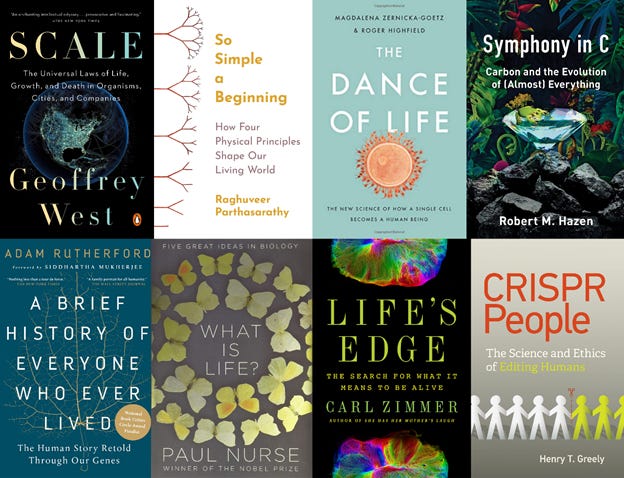Your Ultimate Book Guide to the Biggest Questions in Biology
Eight books that will get you thinking
I often say that “I’m a psychologist who should have been a biologist.” I’ve naturally been drawn to biology since I was a kid, and the field is incredibly diverse. It’s also at the leading edge of the next tech revolution: biotechnology. There’s something in the field for everyone, and this month’s book guide provides eight deep dive books that each strive to give insight into some of the biggest questions in biology. Happy reading!
Scale
Scale: The Universal Laws of Life, Growth, and Death in Organisms, Cities, and Companies by Geoffrey West (2017; Penguin Books) gives insight to the question of how biological systems scale. It’s a fascinating cross-over between physics and biology striving to impart mathematical principles onto biological systems. The result are endlessly interesting applications to animal size, lifespan, and even human cities. Scale remains one of my favorite books of all time to recommend.
So Simple A Beginning
So Simple a Beginning: How Four Physical Principles Shape Our Living World by Raghuveer Parthasarathy (2022; Princeton University Press) gives insight to the basic biological principles that underly all biological systems – self-assembly, regulatory circuits, predictable randomness, and scaling. It’s not for the faint of heart – it’s a true science book. Wonderfully written, yes, but complex content. Perhaps even more impressive than the content are the stunning illustrations throughout the book. An all-around extraordinarily impressive popular science book.
The Dance of Life
The Dance of Life: The New Science of How a Single Cell Becomes a Human Being by Magdalena Zernicka-Goetz and Roger Highfield (2020; Basic Books) gives insight into the earliest stages of cell division after fertilization of an ovum by a sperm, showcasing remarkable work being done in the field of embryology. This book is an overview of the groundbreaking research coming out of Zernicka-Goetz’s lab exploring the earliest stages of cellular development through studying cellular development in lab-grown embryos.
Symphony in C
Symphony in C: Carbon and the Evolution of (Almost) Everything by Robert Hazen (2019; W.W. Norton) gives insight into the carbon cycles that drive life – and most everything else on earth. This book is a deep dive into deep carbon and the interdisciplinary Deep Carbon Observatory that Hazen founded to bridge divides and answer some of the biggest questions in the life sciences. An ambitious effort and excellent example of the benefits of breaking down silos of scientific disciplines.
A Brief History of Everyone Who Ever Lived
A Brief History of Everyone Who Ever Lived: The Human Story Retold Through Our Genes by Adam Rutherford (2017; The Experiment) gives insight into the deep evolution of our human species. Rutherford uses the most recent genetic evidence to understand how humans evolved, how we dispersed, and what our modern ancestry means for understanding who we are. An excellent book and a must read.
What is Life?
What Is Life?: Five Great Ideas in Biology by Paul Nurse (2021; W.W. Norton) gives insight into five revolutions in the understanding of life – the cell, the gene, evolutionary theory, chemistry, and information. It’s a pocket size book you can get through in a single day, but punches well above its literal size. Nurse is an expert communicator, making complex concepts easy to understand.
Life’s Edge
Life's Edge: The Search for What It Means to Be Alive by Carl Zimmer (2021; Dutton) gives insight into the endless quest to define life. Zimmer is an expert science writer, and this book is certainly no exception. Each chapter of this book is like a mini science adventure story about various scientists and experiments that have offered a new perspective on the question “what is life?”. A phenomenal read.
CRISPR People
CRISPR People: The Science and Ethics of Editing Humans by Henry Greely (2021; The MIT Press) gives insight into the complex ethics on the leading edge of biotech innovation: human gene editing. Part modern history on He Jiankui’s unethical genome editing of twins that was revealed in 2018, part exploration of the ethics of the future of gene editing, CRISPR people gives a great overview of the novel CRISPR-cas9 technology that has the potential to change the future of the human species.
This post contains affiliate links, allowing me to earn a small commission when you purchase books from the link provided. There is no cost to you, and this will allow me to keep this newsletter free and open to all. Happy reading!




